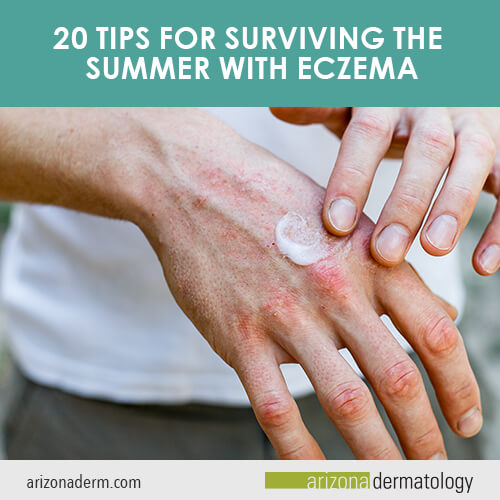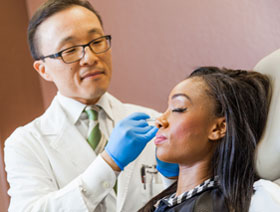 As temperatures rise and beach trips beckon, it’s essential to remember that eczema doesn’t take a vacation during the summer. While we often associate dry, cold winter air with triggering eczema, the heat, sweat, and swimming associated with the summer season can also lead to flare-ups. Many parents of children with eczema report summertime struggles when it comes to managing this condition, also known as atopic dermatitis. But fear not! Our dermatologists have shared twenty invaluable tips to help you reduce eczema symptoms and enjoy a more comfortable summer.
As temperatures rise and beach trips beckon, it’s essential to remember that eczema doesn’t take a vacation during the summer. While we often associate dry, cold winter air with triggering eczema, the heat, sweat, and swimming associated with the summer season can also lead to flare-ups. Many parents of children with eczema report summertime struggles when it comes to managing this condition, also known as atopic dermatitis. But fear not! Our dermatologists have shared twenty invaluable tips to help you reduce eczema symptoms and enjoy a more comfortable summer.
- Stay cool: When the mercury soars, your blood vessels dilate to cool you down, potentially triggering inflammation in eczema-prone individuals. Seek shade when outdoors or stay in air-conditioned spaces during peak temperatures. Wearing loose-fitting clothing and using hand-held fans filled with ice water can also provide quick relief by cooling your skin.
- Hydrate: Adequate hydration helps regulate body temperature and prevents your skin from reacting to excessive heat. Most active adults require three to four liters of water daily, while children should drink their age in eight-ounce glasses. Pay attention to the color of your urine; it should resemble lemonade. Darker urine indicates the need for increased water intake. Remember, you can also hydrate through water-rich foods.
- Rinse off sweat: Sweating cools your body, but it can leave behind irritants that exacerbate eczema. Areas prone to moisture buildup, like the elbows, knees, and neck, become hotspots for flare-ups. After engaging in sweaty activities, rinse off promptly and change into fresh clothes.
- Shower after swimming in chlorine: While some eczema sufferers tolerate chlorinated pools well, others find it irritating. If chlorine water bothers your skin, taking a quick shower after swimming is advisable. However, keep in mind that cleansing removes natural oils, so moisturize with a ceramide-rich lotion immediately after showering while your skin is still damp.
- Avoid hot showers: While a refreshing shower can provide temporary relief, hot water can strip the skin of its natural oils and exacerbate eczema symptoms. Opt for lukewarm showers instead, and limit shower or bath time to around 10 minutes.
- Moisturize regularly: Keeping your skin well-moisturized is crucial, especially during the summer. Apply a fragrance-free and hypoallergenic moisturizer immediately after showering or bathing to lock in moisture. Repeat the application throughout the day, as needed.
- The ocean fixes everything: It may be a seaside town cliche, but seawater, particularly its high mineral concentrations, such as magnesium, can be beneficial for people with eczema. The sodium and iodine in ocean water also possess healing properties. However, saltwater can be uncomfortable and painful on inflamed skin, especially for young children. If you decide to hit the beach, rinse off excess salt after swimming and moisturize well.
- Opt for physical sunscreens: Individuals with eczema are more vulnerable to sun damage and should always use sunscreen. However, certain sunscreen ingredients can worsen eczema symptoms. Choose physical sunscreens that use minerals like zinc oxide or titanium oxide to block UV rays. To test a new sunscreen, apply a small amount to the inside of your elbow and observe any skin reactions over 24-48 hours.
- Choose breathable fabrics: When it comes to clothing, opt for lightweight, breathable fabrics like cotton and linen. These materials allow air to circulate, reducing the risk of sweat buildup and irritation.
- Use gentle detergents: Harsh laundry detergents and fabric softeners can irritate sensitive skin. Opt for mild, fragrance-free detergents specifically formulated for sensitive skin. Avoid using excessive amounts of detergent, as residue left on clothing can also trigger eczema flare-ups.
- Address allergies: Eczema often flares up alongside environmental allergens. If you experience hives, sneezing, a runny nose, itching, or swelling, consult an Arizona Dermatology doctor to discuss allergy medications. Allergy testing can help identify triggers and develop a plan to minimize exposure.
- Use an air purifier: Reduce airborne allergens by using an air purifier in your sleeping area. Dust and pollen can trigger allergic skin reactions and worsen eczema flare-ups. Opt for a purifier with HEPA filters, known for their ability to remove at least 99.97% of airborne particles at least .3 microns in size. Regular dusting can also help.
- Sleep on clean, cotton sheets: When traveling, consider bringing your own sheets and towels to the hotel. Different detergents and fabrics can irritate sensitive skin and trigger outbreaks. Choose 100% cotton sheets and opt for hypoallergenic detergents. Additionally, if you use thick moisturizers to treat eczema at night, it’s essential to wash and dry your sheets frequently or keep an extra set on hand.
- Explore phototherapy: Phototherapy, also known as light therapy, is a non-invasive treatment that effectively reduces itching and inflammation associated with eczema. By exposing the skin to specific forms of UV light, phototherapy enhances the body’s ability to combat bacteria and reduces the risk of infection resulting from scratching. If you’re interested in learning more about this treatment option, consult one of our dermatologists who can guide you through the process and address any questions you may have.
- Practice stress management: Stress is known to worsen eczema symptoms. Engage in stress-reducing activities like yoga, meditation, or deep breathing exercises. Prioritize self-care and make time for activities you enjoy to promote overall well-being.
- Protect your skin from insects: Insect bites can trigger eczema flare-ups and cause further irritation. Use insect repellents specifically designed for sensitive skin, wear long sleeves and pants when spending time outdoors, and avoid areas with high insect activity.
- Be mindful of air conditioning: While air conditioning can provide relief from the heat, it can also dry out the air, leading to increased skin dryness. Consider using a humidifier to add moisture to the indoor environment, especially in your bedroom.
- Avoid prolonged sun exposure: While sunlight can have some benefits for eczema, excessive sun exposure can also trigger flare-ups. Limit your time in direct sunlight, especially during peak hours when the sun is strongest (usually between 10 am and 4 pm). Wear protective clothing, such as wide-brimmed hats and lightweight long-sleeved shirts, and seek shade when possible.
- Be cautious with outdoor activities: Take precautions when participating in activities that involve contact with potential irritants or allergens, such as gardening or outdoor sports. Wear gloves and protective clothing, and rinse off or shower afterward to remove any potential triggers from your skin.
- Seek professional advice: If your eczema symptoms worsen or become difficult to manage, come see us. A dermatologist can provide personalized recommendations and treatment options tailored to your specific needs.
Summer can still be enjoyable even with eczema! Everyone’s experience with eczema varies, so it’s essential to find a routine and set of strategies that work best for you. If you need assistance in managing your or your child’s eczema, don’t hesitate to reach out to us. Let us help you make the most of the season while keeping eczema flare-ups under control.


